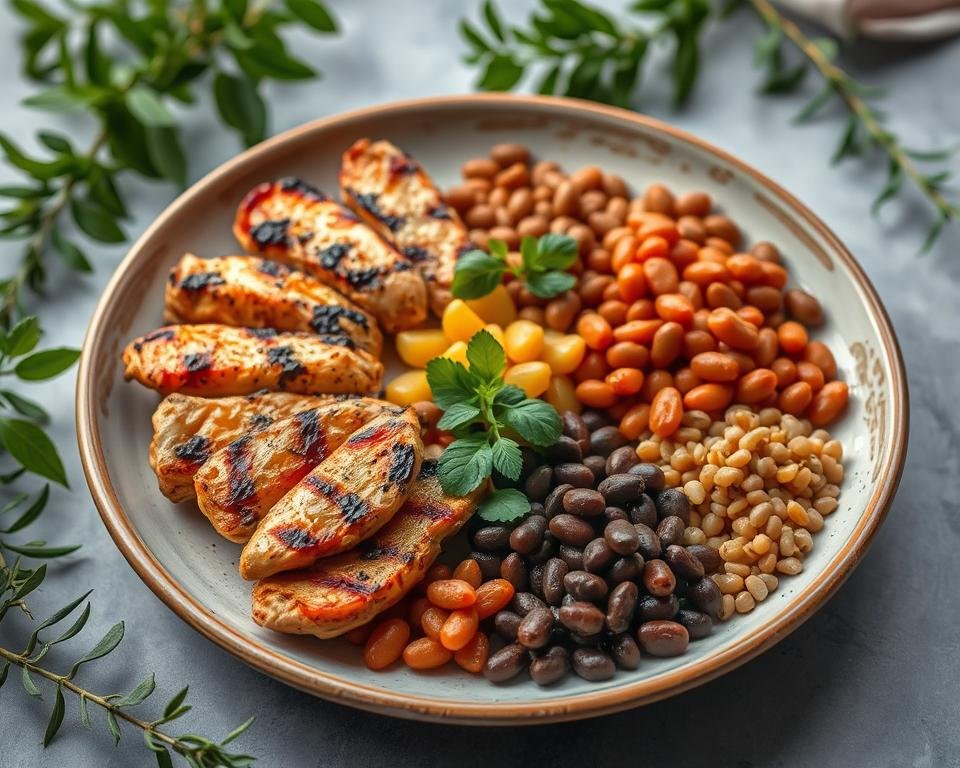Protein is a key nutrient that helps our bodies work right. It’s found in every cell of our bodies, making up about 18-20% of our total body. It’s important for growth, healing, and keeping our cells strong.
Protein also helps carry oxygen, fight off diseases, and grow hair and nails. It’s also a source of energy for our bodies.
The word “protein” comes from the Greek word “proteios,” meaning “primary” or “first rank.” This term has been used for over 130 years. It shows how important protein has always been for us.
There are about 100,000 different proteins in our bodies. Each one lasts only two days or less. This shows how dynamic and constantly changing our proteins are.
From its Greek roots to its variety and short life, proteins are truly fascinating. These facts give us a peek into the complex world of nutrition and biology. As we learn more about protein, we’ll see how it’s essential for a healthy diet.
Protein: The Macronutrient of Life
Proteins are the basic building blocks of life, found in every cell of our bodies. Without them, life as we know it wouldn’t exist. This key macronutrient is vital for many important body functions. It helps build and fix muscles, gives structure to cells, and carries and stores nutrients.
Proteins also help form organs and tissues, and aid in healing and fixing wounds.
Protein’s Essential Role in the Body
Proteins are the protein macronutrient that keeps our bodies healthy and working right. They are the building blocks of growth and repair. They help keep cells, tissues, and organs in good shape.
Having enough protein is key for muscle health, a strong immune system, metabolism, and hormonal balance.
“Proteins are the second most plentiful substance in the body after water, and nine out of the 20 amino acids required by the body are essential, meaning they must be obtained from food.”
Animal foods like meat, poultry, fish, eggs, and dairy are high in quality proteins. They have the right mix of essential amino acids. On the other hand, plant-based foods like legumes, grains, seeds, and nuts have lower-quality proteins because of amino acid imbalances.
But, mixing different plant-based foods can create better-quality proteins building blocks.

Word Origins and Lifespan of Proteins
The word “protein” comes from the Greek “proteios,” meaning “primary” or “first rank.” It has been used for over a century, showing how important proteins are to us. Despite their key role, proteins don’t last long, usually only two days or less.
The Greek Roots of the Word “Protein”
The term protein comes from proteios, highlighting their importance. Proteins are essential for life, doing many jobs in our bodies. They help with everything from breaking down food to building our cells, making them truly vital.
The Short but Mighty Life of Proteins

Even though proteins don’t last long, they are vital for our health. In mammals, proteins typically live for one to two days. Yet, they are constantly being made, broken down, and reused, keeping our bodies working well.
fun facts about protein
Unexpected Protein Sources
Many think protein only comes from animal foods. But, there are many unexpected protein sources to meet our daily needs. For instance, low-sodium parmesan cheese has 41.6 grams of protein per 100 grams. Yellowfin tuna is also high in protein, with 30 grams per 100 grams.
One of the most surprising fun facts is that human hair is made of keratin, a protein. It forms a helical shape and has sulfur bonds that affect hair curliness. So, our hair is a natural protein source we carry daily.
“Protein can be found in many unexpected places beyond just meat, eggs, and legumes.”

These fun facts show its versatility and abundance. They remind us protein is in many foods and even in our bodies. By exploring these unexpected protein sources, we can broaden our food choices and ensure a healthy diet.
10 Protein fun facts
Here are some facts containing some interesting facts about protein
1. Protein Helps Build Muscle
One of the most interesting facts about food is that protein is crucial for building and repairing muscle tissue. It’s essential for athletes and anyone engaging in regular physical activity.
2. Eggs Are the Most Complete Protein
A fun fact about food is that eggs contain all nine essential amino acids, making them one of the most complete sources of protein.
3. Not All Proteins Are Created Equal
One of the interesting facts on food is that there are complete proteins (like meat, fish, and dairy) and incomplete proteins (like beans and grains). Combining incomplete proteins, like rice and beans, can provide a full amino acid profile.
4. You Can Get Protein from Plants
A fun fact about cooking is that plant-based foods like quinoa, lentils, and tofu are excellent protein sources, especially for vegetarians and vegans.
5. Protein Makes You Feel Full
One of the most important food facts and fun discoveries is that protein takes longer to digest, which helps you feel fuller for longer. This is why high-protein diets are often linked to weight management.
6. Greek Yogurt Has More Protein Than Regular Yogurt
A fun fact about food is that Greek yogurt contains nearly double the amount of protein compared to regular yogurt, thanks to the straining process.
7. Your Body Doesn’t Store Protein
Unlike fats and carbohydrates, your body doesn’t store protein. This interesting fact about food means you need a consistent daily intake to meet your body’s needs.
8. Cooking Meat Changes Its Protein Structure
A fun fact about cooking is that heat causes proteins in meat to denature, changing their structure. This process makes the meat firm but also easier to digest.
9. Some Grains Are Surprisingly High in Protein
Quinoa, amaranth, and buckwheat are some of the highest-protein grains, offering interesting facts on food for those looking to diversify their protein sources.
10. Protein is Crucial for Hair and Nails
One of the more surprising food facts and fun insights is that protein is a key building block for hair and nails. A lack of protein can lead to brittle nails and hair loss.
Protein and Satiety: Keeping You Fuller for Longer
Protein is known for making you feel full and satisfied after eating. It helps control hunger hormones and keeps you feeling full. Studies show that eating more protein can help you eat fewer calories, which is good for weight management.
Protein’s Role in Weight Management
Protein helps you feel full and less hungry, which is great for keeping a healthy weight. Research shows that eating 30% more protein can cut daily calorie intake by 441 calories, without feeling hungry. It also helps build muscle, boost metabolism, and aid in weight loss. Plus, it’s good for blood pressure and bone health.
“Overweight women who ate 30% of their calories from protein lost 11 pounds (5 kg) in 12 weeks without intentionally restricting their diet.”
Protein affects hunger hormones like ghrelin and leptin. It lowers ghrelin, which makes you hungry, and increases feelings of fullness and satisfaction.

Using protein’s benefits can help you manage your weight and live a healthy life. The science is clear: protein is key to feeling full and satisfied, making it essential for weight management and well-being.
Comparing Plant-Based Proteins, Animal Proteins, and Their Role in a Balanced Diet
When exploring dietary choices, it’s essential to understand the role of plant-based proteins, animal proteins, and how they compare to other macronutrients like carbohydrates and fats. Plant-based proteins such as lentils, chickpeas, and quinoa are not only rich in protein but also provide essential fiber and antioxidants, making them a great option for a balanced diet.
On the other hand, animal proteins like chicken, eggs, and fish are complete protein sources, containing all essential amino acids needed for muscle repair and growth. For those seeking convenient options, protein powders offer a versatile way to boost protein intake, with both plant-based and animal-derived powders available to suit dietary preferences. While proteins play a vital role in building and maintaining muscle, balancing them with appropriate levels of carbohydrates and fats is key to sustaining energy and overall health.
Surprising Protein Facts from Around the World
Protein is key for a healthy diet, but how we eat it varies worldwide. Exploring protein facts globally shows its diverse and interesting role.
A Tiny Country with a Big Appetite for Meat
Luxembourg is a small country with a big meat love. Its 600,000 people eat more meat than anyone else. Each person eats about 300 pounds of meat every year.
The Chicken or the Egg? Protein Has the Answer!
The chicken or egg debate has been solved. Scientists found that chickens came before eggs. This is because only hens can make eggshells, thanks to special proteins.
These facts show how unique and interesting protein is worldwide. From Luxembourg’s meat love to the chicken egg mystery, protein surprises us in many ways.
“Protein is the macronutrient that keeps us feeling full and satisfied, making it a key part of a healthy diet.”
Conclusion
Protein is a key part of a healthy diet. It has a rich history and plays many roles in our bodies. It’s not just for building muscles and managing weight.
Protein can be found in many foods, and it’s interesting to learn about its global uses. It’s vital for our health and helps our bodies function well.
Knowing how important protein is, we can choose better foods for our diets. It doesn’t matter if it comes from animals or plants. Protein helps keep us healthy and supports our overall well-being.
As we learn more about protein, its importance in a healthy lifestyle will grow. By using the latest research, we can make smart choices about our protein intake. This helps us stay healthy for the long term.




Pingback: 1000 calories a day dog food
Pingback: Eating 6000 Calories a Day: Health Impact & Effects
Pingback: carnivore diet: A Complete Guide to Animal-Based Eating